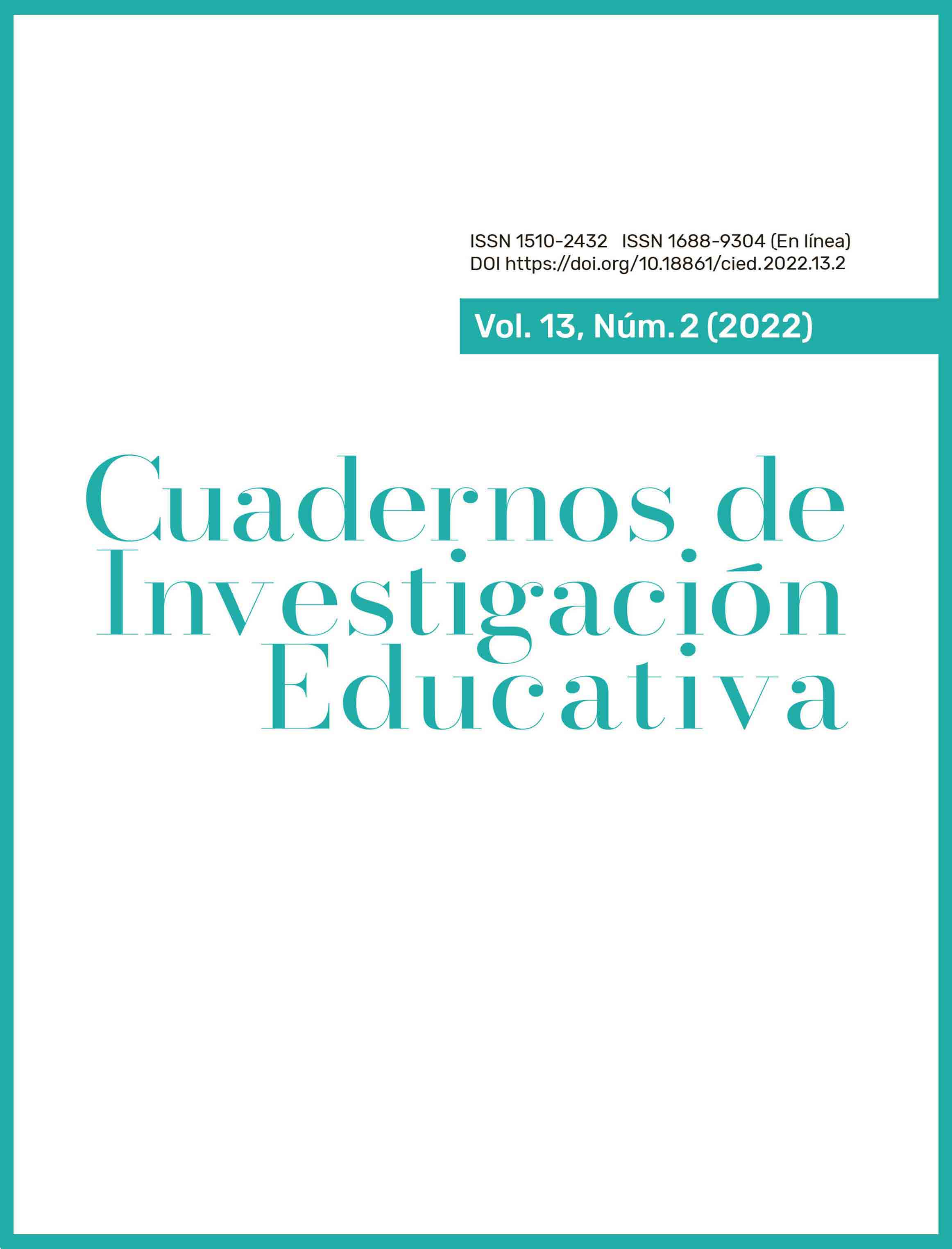Formative Research in Learning Communities in Initial Teacher Training
DOI:
https://doi.org/10.18861/cied.2022.13.2.3180Keywords:
initial teacher training, professional learning communities, formative research, ubiquitous learning, digital technologies, dialogical professionalism, research competencesAbstract
This communication accounts for the interactions and processes related to Formative Research (FR) that arise within a Professional Learning Community (PLC) made up of teachers and student teachers from a Regional Center for Teachers. It is anchored on a research project whose objective was to develop Investigative Strategies (IS) and to evaluate their degree of development in teacher training students within the framework of Ubiquitous Learning (UL). Students were expected to develop Investigative Competencies (IC) through the construction of research experiences that articulated culturally relevant pedagogies, technologies and strategies consistent with their professional training. It was framed within a mixed action-research approach. The data analyzed in this communication arises from the application of instruments such as observations of synchronous meetings and documents, as well as focus groups between teachers and between students. The analysis was eminently qualitative. Some findings show the genuine interaction that took place within the community. Regarding the work in the formed PLC, “dialogical professionalism” played a leading role. It was also identified that reflection acted as the backbone of the agreements and decisions. Regarding tensions, flexibility was the cornerstone in the search for solutions. In relation to the processes, it was found that the formation of the PLC and the work in FR entails facing multiple difficulties, but as a counterpart, the deployment of different strategies stood out. In a context that was visibly characterized by ubiquity, the inclusion of digital technologies was crucial. As a conclusion, it is possible to affirm that the work in FR carried out by the community formed in this research allowed to enhance reflection processes that favoured the professional development of its members.
Downloads
References
Artopoulos, A., & Kozak, D. (2011). Tsunami 1:1: estilos de adopción de tecnología en la educación latinoamericana. CTS: Revista Iberoamericana de ciencia, tecnología y sociedad, 6(18). https://dialnet.unirioja.es/servlet/articulo?codigo=3716883
Burbules, N. (2012). El aprendizaje ubicuo y el futuro de la enseñanza. Encounters on education = Encuentros sobre educación = Recontres sur l'éducation, 13, 3-14.
Díez-Gutiérrez, E., & Díaz-Nafría, J. (2018). Ecologías de aprendizaje ubicuo para la ciberciudadanía crítica. Comunicar, 54, 49-58. https://doi.org/10.3916/C54-2018-05
Espinoza Freire, E. E. (2020). La investigación formativa. Una reflexión teórica. Conrado, 16(74), 45-53. http://scielo.sld.cu/scielo.php?script=sci_arttext&pid=S1990-86442020000300045
Figueroa Céspedes, I. (2019). El profesionalismo dialógico como recurso para la construcción de un rol docente transformador. Paideia, 64, 143-165. http://revistasacademicas.udec.cl/index.php/paideia/article/view/2140
Fullan, M., & Hargreaves, A. (1999). La escuela que queremos: los objetivos por los cuales vale la pena luchar. Amorrortu.
Fullan, M., & Hargreaves, A. (2012). Reviving teaching with ‘professional capital’. Education Week. https://www.edweek.org/policy-politics/opinion-reviving-teaching-with-professional-capital/2012/06
García Aretio, L. (2017). Educación a distancia y virtual: calidad, disrupción, aprendizajes adaptativo y móvil. RIED. Revista Iberoamericana de Educación a Distancia, 20(2), 9-25. https://doi.org/10.5944/ried.20.2.18737
González-Sanmamed, M., Sangrà, A., Souto-Seijo, A., & Estévez Blanco, I. (2018). Ecologías de aprendizaje en la Era Digital: desafíos para la Educación Superior. PUBLICACIONES, 48(1), 25-45. https://doi.org/10.30827/publicaciones.v48i1.7329
Hermann, A. (2013). El entramado sociotécnico en la construcción del conocimiento en la sociedad red. Sophia: Colección de Filosofía de la Educación, 15. https://doi.org/10.17163/soph.n15.2013.09
Labarrere, A. (2016). Zona de Desarrollo Próximo como eje del desarrollo de los estudiantes: de la ayuda a la colaboración. Summa Psicológica, 13(1), 45-56. https://dialnet.unirioja.es/servlet/articulo?codigo=5585077
Maina, M. y García, I. (2016). Articulating personal pedagogies through learning ecologies. En B. Gros, Kindshuk y Maina, M. (eds.), The future of ubiquitous learning: learning designs for emerging pedagogies (pp. 73-94). Springer. https://doi.org/10.1007/978-3-662-47724-3_5
Mejía Navarrete, J. (2011). Problemas centrales del análisis de datos cualitativos. Revista Latinoamericana de Metodología de la Investigación, 1(1), 47-60. http://relmis.com.ar/ojs/index.php/relmis/article/view/43/46
Muñoz, M., y Garay, F. (2015). La investigación como forma de desarrollo profesional docente: Retos y perspectivas. Estudios Pedagógicos, 41(2), 389-399. http://dx.doi.org/10.4067/S0718-07052015000200023
Real Academia Española (2021). Genuino. En Diccionario de la lengua española. https://dle.rae.es/genuino%20?m=form
Real Academia Española (2021). Interacción. En Diccionario de la lengua española. https://dle.rae.es/interacci%C3%B3n?m=form
Rebollo, C., Nieto, S. & Cabrera, A. (2021). Conformación de Comunidades Profesionales de Aprendizajes para el desarrollo de las estrategias investigativas en futuros docentes. Revista Enseñanza de Química, 4(1), 42-59.
Shabani, K. (2016). Applications of Vygotsky’s sociocultural approach for teachers’ professional development. Cogent Education, 3(1), 1-10. https://doi.org/10.1080/2331186X.2016.1252177
Turpo-Gebera, O., & Acuña, L. (2019). Investigación formativa y formación de investigadores en educación I. Editorial UNSA. https://fce.unsa.edu.pe/wp-content/uploads/2019/04/libinvfor.pdf
Turpo-Gebera, O., Quispe, P. M., Paz, L. C., & Gonzales-Miñán, M. (2020). La investigación formativa en la universidad: sentidos asignados por el profesorado de una Facultad de Educación. Educação e Pesquisa, 46. https://dialnet.unirioja.es/servlet/articulo?codigo=7253099
Velandia-Mesa, C., Serrano-Pastor, F. J., & Martínez-Segura, M. J. (2017). La investigación formativa en ambientes ubicuos y virtuales en Educación Superior. Comunicar: Revista Científica de Comunicación y Educación, 25(51), 9-18. https://doi.org/10.3916/C51-2017-01
Velázquez, B., & López, R.E. (2021). Análisis crítico del concepto “aprendizaje ubicuo” a través de la Cartografía Conceptual. Revista Educación a Distancia (RED), 21(66). https://doi.org/10.6018/red.430841






